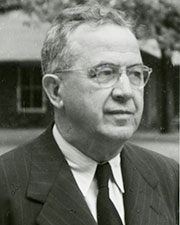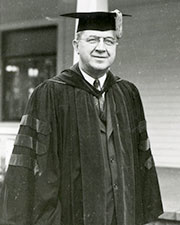 When Vernon F. Schwalm ’13 returned to Manchester in the fall of 1941, he was concerned about following the charismatic Otho Winger as president.
When Vernon F. Schwalm ’13 returned to Manchester in the fall of 1941, he was concerned about following the charismatic Otho Winger as president.
Schwalm taught history at Manchester from 1913 to 1917 and served as dean until 1927 when he left to become president of McPherson College. The University of Chicago-educated intellectual was well aware of Winger’s colorful legacy. “He was everywhere,” Schwalm recalled of Winger, “in the classroom, in chapel … or in the boys dorm at midnight quieting a riot.”
When the bombing of Pearl Harbor a few months later plunged the United States into World War II, filling Winger’s shoes became the least of Schwalm’s worries. He needed to guide the college through some of the nation’s – and Manchester’s – darkest days and, in many ways, he proved to be the right person at the right time.
As male students joined the military or alternative service, Manchester’s enrollment plunged from 645 to 495 in one year. The student newspaper regularly published the names of former classmates killed in action and students felt the “unrelenting presence of the draft,” wrote Timothy K. Jones in his book Manchester College: A Century of Faith, Learning and Service.
Gasoline rationing kept students from going home for Thanksgiving in 1942, so Schwalm made the holiday as comforting as he could. He offered words of encouragement at a special chapel service and presided over the meal that faculty and students shared in the dining hall.
Like many other colleges across the nation, Manchester adopted a six-day schedule by spring semester of 1942, with classes running from 8 a.m. Monday to noon Saturday. The accelerated pace enabled some male students to complete college before going into the service.
By the fall of 1944, Manchester had only 410 students – 315 women and 95 men. With so few men on campus and no gasoline for travel, intercollegiate athletics took a hiatus. For the first time in MC’s history, women were allowed to lead student government, though it was a hotly contested issue.
In addition, as falling enrollments meant falling revenue during the war years, President Schwalm was forced to let a number of faculty go.
When the war ended in 1945, Schwalm faced an entirely new set of challenges.
Enrollment soared as veterans returned with the newly minted GI Bill. Many of them brought wives to college and some of them had children. It was common for veterans to be older than the faculty members who were teaching them. The veterans also were wise to the ways of the world and more likely to challenge authority, especially in regards to Manchester’s then-conservative rules.
To accommodate the influx of students and their families, Manchester brought in 25 war-surplus trailers and several barracks to provide temporary housing until permanent solutions could be constructed.
Just as critical, Schwalm needed to rebuild the faculty as fast as he could. The teachers he hired would eventually read like a “Who’s Who” of Manchester: Howard Book, Emerson Niswander, Philip Orpurt ’48, Doris Garey, Russell Bollinger ’26, Earl Garver ’33, Eldon Burke ’22, Clyde Holsinger ’41, T. Wayne Rieman, Paul Keller ’35, William Eberly ’48, T.Q. Evans ’45, Gary Deavel ’52, Henry Glade, Orrell Little ’21, Donald Royer, Dorothy Johnson, Genita Speicher and Vernon Stinebaugh ’41, among others.
 Also in the post-war years, Schwalm advanced the liberal arts culture at Manchester and doubled the number of faculty members with doctoral degrees. He oversaw the fundraising and construction of Calvin Ulrey Hall (1948), the Winger Memorial Arts Building (1952), the original wing of East Hall (1956) and he began fundraising for the Holl-Kintner Hall of Science, which opened in 1959.
Also in the post-war years, Schwalm advanced the liberal arts culture at Manchester and doubled the number of faculty members with doctoral degrees. He oversaw the fundraising and construction of Calvin Ulrey Hall (1948), the Winger Memorial Arts Building (1952), the original wing of East Hall (1956) and he began fundraising for the Holl-Kintner Hall of Science, which opened in 1959.
Perhaps Schwalm’s most prestigious achievement was his vision for an undergraduate program that would train young leaders for work in peacebuilding and international relations. He recruited Gladdys Muir, then a professor at LaVerne College in California, to join Manchester’s faculty and develop the world’s first undergraduate peace studies program, which endures today.
Schwalm wrote several books, including one about his predecessor, but by then Winger’s legacy no longer cast a shadow. Vernon Schwalm retired in 1956, leaving his own big shoes to fill.
By Melinda Lantz ’81
Source: A Century of Faith, Learning and Service, by Timothy K. Jones, 1989